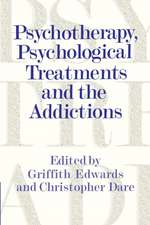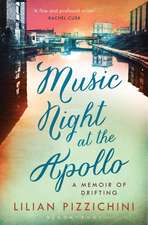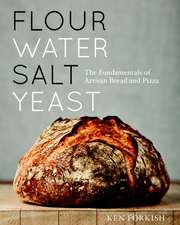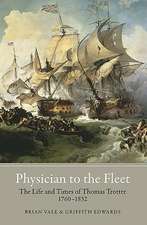Alcohol: The World's Favorite Drug
Autor Griffith Edwardsen Limba Engleză Paperback – 30 noi 2003
Alcohol is everywhere. Walk down any street in the western world and before long your feet will kick against an empty beer can, or your attention will be captured by an alluring advertisement that suggests that alcohol can magically transform your life. Its use is integral to many aspects of popular culture, but it is also a substance that has at times been preached against and even prohibited.
In this book, Griffith Edwards uses both history and chemistry to explore the whole issue of alcohol. Is it medicine, a delightful potion, poison, or a mysterious combination of all three? What part has alcohol played in various cultures and religions? Why do different people behave differently when drunk? What cures for habitual inebriation were popular in the past? Why is alcoholism considered a disease? What is "safe drinking"? Is alcohol good for the heart? Do current treatments work? Does Alcoholics Anonymous have the answer?
Armed with the best solid information science, history, and sociology have to offer, Edwards asks how, in the light of this knowledge, society might in the future better handle this pleasure-giving, somewhat dangerous drug. Can society get its pleasure out of alcohol without the inevitable suffering that accompanies misuse? If so, what steps should we take to protect ourselves and others?
Already considered in England to be a classic in the field, Alcohol will prove to be fascinating reading for the drinker and nondrinker alike.
In this book, Griffith Edwards uses both history and chemistry to explore the whole issue of alcohol. Is it medicine, a delightful potion, poison, or a mysterious combination of all three? What part has alcohol played in various cultures and religions? Why do different people behave differently when drunk? What cures for habitual inebriation were popular in the past? Why is alcoholism considered a disease? What is "safe drinking"? Is alcohol good for the heart? Do current treatments work? Does Alcoholics Anonymous have the answer?
Armed with the best solid information science, history, and sociology have to offer, Edwards asks how, in the light of this knowledge, society might in the future better handle this pleasure-giving, somewhat dangerous drug. Can society get its pleasure out of alcohol without the inevitable suffering that accompanies misuse? If so, what steps should we take to protect ourselves and others?
Already considered in England to be a classic in the field, Alcohol will prove to be fascinating reading for the drinker and nondrinker alike.
Alcohol is everywhere. Walk down any street in the western world and before long your feet will kick against an empty beer can, or your attention will be captured by an alluring advertisement that suggests that alcohol can magically transform your life. Its use is integral to many aspects of popular culture, but it is also a substance that has at times been preached against and even prohibited.
In this book, Griffith Edwards uses both history and chemistry to explore the whole issue of alcohol. Is it medicine, a delightful potion, poison, or a mysterious combination of all three? What part has alcohol played in various cultures and religions? Why do different people behave differently when drunk? What cures for habitual inebriation were popular in the past? Why is alcoholism considered a disease? What is "safe drinking"? Is alcohol good for the heart? Do current treatments work? Does Alcoholics Anonymous have the answer?
Armed with the best solid information science, history, and sociology have to offer, Edwards asks how, in the light of this knowledge, society might in the future better handle this pleasure-giving, somewhat dangerous drug. Can society get its pleasure out of alcohol without the inevitable suffering that accompanies misuse? If so, what steps should we take to protect ourselves and others?
Already considered in England to be a classic in the field, Alcohol will prove to be fascinating reading for the drinker and nondrinker alike.
In this book, Griffith Edwards uses both history and chemistry to explore the whole issue of alcohol. Is it medicine, a delightful potion, poison, or a mysterious combination of all three? What part has alcohol played in various cultures and religions? Why do different people behave differently when drunk? What cures for habitual inebriation were popular in the past? Why is alcoholism considered a disease? What is "safe drinking"? Is alcohol good for the heart? Do current treatments work? Does Alcoholics Anonymous have the answer?
Armed with the best solid information science, history, and sociology have to offer, Edwards asks how, in the light of this knowledge, society might in the future better handle this pleasure-giving, somewhat dangerous drug. Can society get its pleasure out of alcohol without the inevitable suffering that accompanies misuse? If so, what steps should we take to protect ourselves and others?
Already considered in England to be a classic in the field, Alcohol will prove to be fascinating reading for the drinker and nondrinker alike.
Preț: 109.28 lei
Nou
Puncte Express: 164
Preț estimativ în valută:
20.91€ • 21.75$ • 17.27£
20.91€ • 21.75$ • 17.27£
Carte disponibilă
Livrare economică 24 martie-07 aprilie
Preluare comenzi: 021 569.72.76
Specificații
ISBN-13: 9780312302368
ISBN-10: 0312302363
Pagini: 230
Dimensiuni: 140 x 216 x 20 mm
Greutate: 0.32 kg
Ediția:Reprint
Editura: St. Martin's Press
ISBN-10: 0312302363
Pagini: 230
Dimensiuni: 140 x 216 x 20 mm
Greutate: 0.32 kg
Ediția:Reprint
Editura: St. Martin's Press
Notă biografică
Griffith Edwards is one of the world's leading experts on alcohol. Born in India, he received his MD from Oxford University. For 40 years Edwards has made a specialty of being both fair-minded and catholic in his study of alcoholism. He has made the Addiction Research Unit - more recently the National Addiction Center - at the Maudsley Hospital in London, the finest international center for postgraduate education in addiction in the world. He is editor-in-chief of the scientific journal, Addiction. For many years he has been a frequent visitor to the US and was a consultant to the White House Office on the prevention of drug abuse. He has been awarded many major international scientific prizes, including the Nathan B. Eddy medal of the US College on Problems of Drug Dependence, the Jellinek Memorial Prize, and the annual award of the American Educational and Research Society on Alcohol. He was named a Commander of the British Empire (C.B.E.) in 1987, awarded for services to social science and medicine. Married with two grown-up children, he and his wife live in Greenwich, England.







